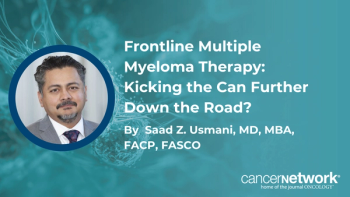
Oncology NEWS International
- Oncology NEWS International Vol 15 No 5
- Volume 15
- Issue 5
RFA Effective for Single, Small Hepatocellular Carcinoma
The minimally invasive procedure of radiofrequency ablation (RFA) appears to be as effective as surgical resection for the treatment of patients with a small hepatocellular carcinoma (HCC) and offers similar survival, according to a study presented at the 31st Annual Meeting of the Society of Interventional Radiology (abstract 1021). "Radiofrequency ablation can offer the same life expectancy as surgical resection to patients with solitary, small HCC, most of whom cannot tolerate a resection," said Riccardo Lencioni, MD, University of Pisa, Italy.
TORONTO, OntarioThe minimally invasive procedure of radiofrequency ablation (RFA) appears to be as effective as surgical resection for the treatment of patients with a small hepatocellular carcinoma (HCC) and offers similar survival, according to a study presented at the 31st Annual Meeting of the Society of Interventional Radiology (abstract 1021). "Radiofrequency ablation can offer the same life expectancy as surgical resection to patients with solitary, small HCC, most of whom cannot tolerate a resection," said Riccardo Lencioni, MD, University of Pisa, Italy.
Dr. Lencioni noted that oncologists have one advantage with HCC: "We know who will develop the tumor. The population at risk is clearly identified," he said. Because of this, people with chronic liver disease, such as hepatitis or cirrhosis, generally undergo screening every 6 months or so. The downside is that this is a very difficult population to treat, he said. Surgical resection has been the first choice, but in some patients, removing a tumor along with some surrounding tissue leads to a drop in liver function. "While the tumor may be removed, what's left behind isn't healthy tissue. This is why this type of early-diagnosis surgical resection cannot be performed safely in about 90% of patients," he said.
Dr. Lencioni pointed out that although HCC has historically mostly affected people living in Asian and Southern European countries, "the incidence is rising every year, even in North America, particularly in the United States, because of the dissemination of hepatitis C virus infections. Increasing numbers of patients got the infection in past years, and now they are developing the tumor."
The investigators searched the Tumor Radiofrequency Ablation Italian Network (TRAIN), which contains data on more than 1,000 HCC patients across Italy, for patients with a uninodular HCC of 5 cm or less with no portal vein invasion or extraheptic spread and Child-Pugh class A cirrhosis, who underwent either surgical resection (38 patients) or RFA (124 patients). Patients were matched for age, tumor size, date of diagnosis, and AFP (alpha-fetoprotein) level. RFA was performed under ultrasound guidance using the RITA Medical device.
Three-year overall survival was similar between the RFA (71.8%) and resection groups (65.1%) (P = .1631). "We were really very impressed to see that ablation achieved the same results as surgery," he said. Tumor recurrence rates were also similar: 55.2% for RFA and 58.5% for resection. With respect to local tumor progression, RFA was not as effective as resection. "Local relapse was 0% for resection and 19.3% for RFA, but this is something we can manage with repeat RFA," Dr. Lencioni said. Because patients come in for frequent follow-up, repeat RFA is not difficult to schedule. RFA is easier to perform than surgery and is not accompanied by the same risks and morbidities, he said.
Articles in this issue
almost 20 years ago
NCCN Soft-Tissue Extremity Sarcoma Guidelines Clarify Follow-up Schedulealmost 20 years ago
Genentech Files sBLA for Avastin for First-Line NSCLC Treatmentalmost 20 years ago
New Imaging, ChemoRT Recommendations From NCCNalmost 20 years ago
Panitumumab Improves PFS in Advanced Colon Caalmost 20 years ago
Studies Question Watchful Waiting for Some Prostate Ca Ptsalmost 20 years ago
Growing Evidence Supports Stem Cell Hypothesis of Canceralmost 20 years ago
FDA Approves New Every-3-Week Dosing for Aranespalmost 20 years ago
Telephone Often Delivers News of Breast Cancer Diagnosisalmost 20 years ago
IND Submitted for CYT-500Newsletter
Stay up to date on recent advances in the multidisciplinary approach to cancer.






































